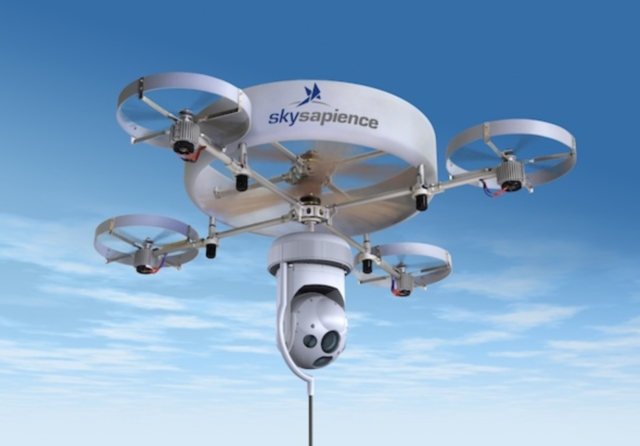The ‘HoverMast’ developed by the Israeli start-up company Sky Sapience is scheduled to go on an operational demonstration in the upcoming months, demonstrating the system’s capability to expand the surveillance coverage of unmanned ground vehicles. The payload currently integrated on the HoverMast is the T-Stamp from Controp, a stabilized multi-sensor payload.
Sky Sapience developed HoverMast in the past two years, in response to an Israel Ministry of Defense (MOD) requirement for a lightweight tethered hovering platform. The system was one of several concepts evaluated by the MOD Research and Development Directorate (DDRD), which eventually selected the HoverMast for the sole developer of the tethered platform technology. Under the partnership with DRDD Sky Sapience developed the platform and conducted a series of prototype flight tests. HoverMast is positioned as an effective platform for military surveillance, observation and target acquisition applications, as well as deployment of communications gear, communications intelligence (COMINT) and other electronic devices. It will also offer an affordable application for border surveillance, urban security, crowd control and other civil applications
According to Brig. General (IAF Ret.) Gabriel Shachor, CEO and Founder of Sky Sapience the HoverMast was developed specifically for small vehicles such as the Guardium-LS from G-Nius, the vehicle selected for integration with the HoverMast. Other applications include the Zibar light reconnaissance vehicle. According to Shachor, the platform is due to enter production toward the autumn this year. Sky Sapience has strategic partnerships with DRDD (MAFAT) – the IMOD research and development agency and G-NIUS Unmanned Ground Systems Ltd.
Shachor claims the HoverMast favorably compares to the 7-5m’ telescopic masts currently mounted on surveillance vehicles, offering faster response, lighter weight, and the capability to operate on the move. Furthermore, the new platform alleviates the need to operate from a horizontal surface and is less sensitive to wind gusts. According to Shachor, the HoverMast would also be more affordable than mast mounted systems.
The deployment is fully automatic, with HoverMast deploying from the stowed position to an elevation of 30-50 meters in just 15 seconds. A cable that also provides power supply and wide-band data link tethers the vehicle. The platform uses a coaxial counter-rotating ducted fan for lift generation, with four thrusters providing station keeping, maneuvering and stabilization. At a 10kg net platform weight HoverMast can carry up to 9 kg of payload, comprising electro-optic sensors, laser designators, radar, or signals intelligence sensors. Sensor data can be transmitted to remote clients or fed through the tether datalink to the base station.
In the stowed position the HoverMast automatically folds into a compact 72 cm diameter container, carried on a vehicle flatbed or roof, mounted on UGVs or All Terrain Vehicles (ATV), or small naval craft; making the system especially suited for Special Forces, border and port protection, and infantry missions.
Source: Defense Update


This type of aircraft was invented in Lithuania. Application LT2012007 “Method of controlling a helicopter with six or more rotors” :
http://lamat.me/patents/letter_LT2012007.pdf
Regards
Aleksey Zaitsevsky
(the inventor)